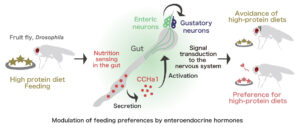Yuto Yoshinari*1,2, Takashi Nishimura*1, Taishi Yoshii 3, Shu Kondo 4,5 Hiromu Tanimoto 6, Tomoe Kobayashi 7, Makoto Matsuyama 7, Ryusuke Niwa* 2(1. Metabolic Regulation and Genetics, Institute for Molecular and Cellular Regulation, Gunma University; 2. Life Science Center for Survival Dynamics, Tsukuba Advanced Research Alliance (TARA), University of Tsukuba; 3. Graduate School of Environmental, Life, Natural Science and Technology, Okayama University; 4. Department of Biological Science and Technology, Faculty of Advanced Engineering, Tokyo University of Science; 5. Invertebrate Genetics Laboratory, National Institute of Genetics; 6. Graduate School of Life Sciences, Tohoku University; 7. Division of Molecular Genetics, Shigei Medical Research Institute; *: Corresponding author)
About
A research group led by Assistant Professor Yuto Yoshinari and Professor Takashi Nishimura (Laboratory of Metabolic Regulation and Genetics) and by Technical Staff Takayuki Yamada at the RIKEN Center for Biosystems Dynamics Research has A research group led by Assistant Professor Yuto Yoshinari and Professor Takashi Nishimura (Laboratory of Metabolic Regulation and Genetics), Professor Ryusuke Niwa (Tsukuba Advanced Research Alliance, University of Tsukuba), and Professor Taishi Yoshii (Graduate School of Environmental, Life, Natural Science and Technology, Okayama University) has elucidated one aspect of the mechanism that prevents excessive protein feeding using Drosophila melanogaster as a model organism.
In this study, the research team revealed that the enteroendocrine hormone CCHa1, secreted by enteroendocrine cells in the gut, suppresses the appetite for protein. It was found that CCHa1 secreted by enteroendocrine cells is received by enteric neurons extending into the gut and transmits the information to the gustatory neurons, thereby preventing excessive protein intake. Furthermore, it was revealed that when CCHa1 signaling does not function properly, Drosophila overconsumes a high-protein diet and accumulates toxic ammonia in the body.
This study suggests that enteroendocrine hormones may be involved in diseases such as eating disorders and picky eating, and future treatments targeting enteroendocrine hormones are expected.
Paper information
Yoshinari Y, Nishimura T, Yoshii T, Kondo S, Tanimoto H, Kobayashi T, Matsuyama M, Niwa R. A high-protein diet-responsive gut hormone regulates behavioral and metabolic optimization in Drosophila melanogaster. Nat Commun. 2024 Dec 30;15(1):10819.
Online URL
https://doi.org/10.1038/s41467-024-55050-y








